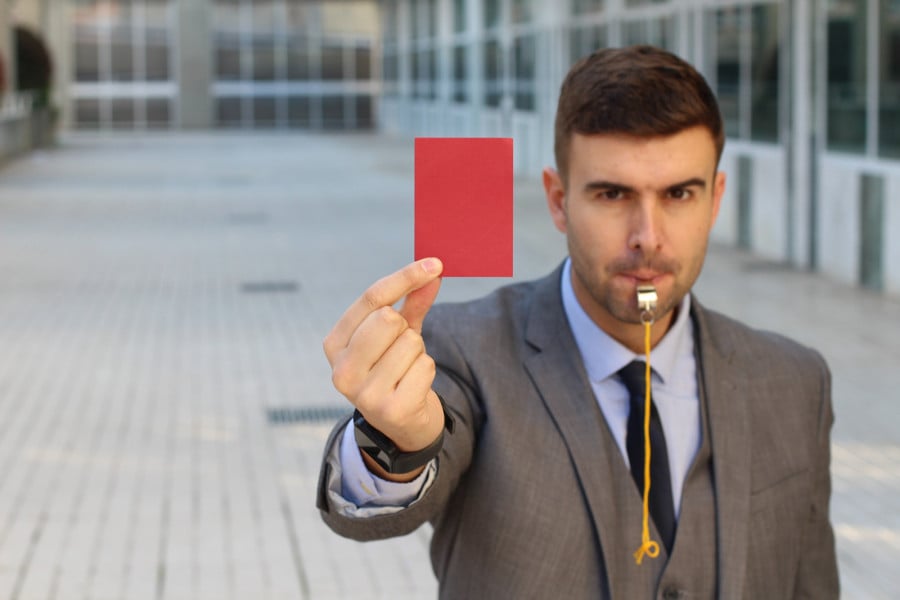When can sports organisations dismiss employees without fault?

The period since the turn of the year will undoubtedly go down as one of the toughest in the history of sport. Covid-19 has seen almost every major sporting event either cancelled or postponed, athletes cannot train in their usual routines, clubs are missing out on significant revenues and we still have no real certainty as to how long behind-closed-doors events will be necessary. The Black Lives Matter (BLM) movement has also had a significant and arguably landscape-changing impact on sport. Confederate flags have been banned from NASCAR races and the NFL has made a high profile U-turn on its national anthem policy in relation to players “taking the knee” before games. Indeed, “taking the knee” has now been adopted as a sign of solidarity across a variety of different sporting competitions.
In amongst all of the major headlines, the departure of LA Galaxy’s Serbian winger Alexander Katai, who was dismissed through no fault of his own, may have slipped under the radar. What did he do wrong, you ask? Well, on the face of it, some would say nothing. Katai’s wife posted “racist and violent” messages on Instagram regarding BLM protests, Katai took “full responsibility” for his wife’s actions and – as is often the case in sporting circles – his departure from the Galaxy was by mutual agreement[1]. The situation throws up a number of questions. Should Katai have taken responsibility for views that he confirmed he strongly disagrees with? Should his wife’s actions have led to his departure from the club? If the Serbian had not agreed to leave, could the club have fairly dismissed him anyway?
In this article, we look at some common (and not so common) situations where dismissals may be possible in a sporting context without there needing to be any significant fault on the part of the individual(s) dismissed. Specifically, we examine:
- Fixed term contracts
- Redundancy
- Personality clashes
- Reputational risk
- Third party pressure
- Compulsory retirement
- Inability to maintain attendance
At the outset, it is worth noting that Jess Varnish’s long legal battle with British Cycling illustrates the intricacies of employment status as it applies to professional athletes. In order to benefit from unfair dismissal protection in the UK, an athlete must be an employee of the dismissing organisation (with two years’ unbroken service in the majority of cases). However, not all athletes (including funded athletes) meet the criteria of being an employee. For more information on this distinction and its implications, please see this LawInSport article[2].
To continue reading or watching login or register here
Already a member? Sign in
Get access to all of the expert analysis and commentary at LawInSport including articles, webinars, conference videos and podcast transcripts. Find out more here.
- Tags: Athlete Welfare | Discrimination | Dispute Resolution | Employment | Football | Major League Soccer | Premier League | Rugby Union | UK | Unfair Dismissal | US
Related Articles
- Dr. Eva Carneiro's claims against Chelsea and Jose Mourinho: breaking down the legal issues
- The legality of fixed-term employment contracts in European professional football – The Müller case and beyond
- The employment status and rights of funded athletes in the UK
- Israel Folau and Rugby Australia’s Code of Conduct hearing - the likely legal arguments
- Sport and employment law – the year in review 2019/20
- The curious case of Wigan Athletic and the English Football League’s owners & directors test
Written by
Jonathan Rennie
Jonathan is a partner at LEVEL. He has over 20 years’ experience as an employment lawyer with a particular expertise in contentious matters. He is dual qualified in Scotland and England and Wales and is recognised as an accredited specialist in employment law by the Law Society of Scotland.
Jonathan has significant corporate experience having qualified as a Chartered Secretary and worked in house for FTSE 100 companies.
He also chairs judicial disciplinary panels for both the English Football Association (general and anti-discrimination panel) and the Scottish Rugby Union as well as working with sports organisations and governing bodies on employment matters including player and manager disputes and discrimination investigations.
He is appointed to Sport Resolutions legal arbitration panel and in 2023 was appointed to the Court of Arbitration for Sport as a legal arbitrator on both the football and general sports panel. Jonathan is also a trustee and director of Street League, the sports employability charity for young people.





